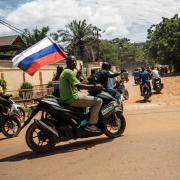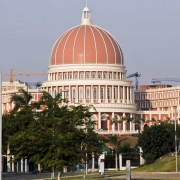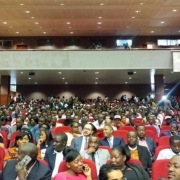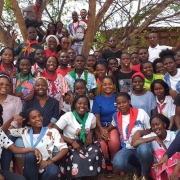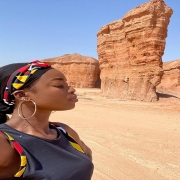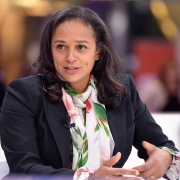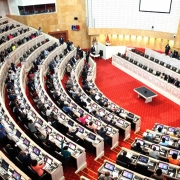The “Russian belt” in the Sahel and Angola

The coup in Niger
Mr Mohamed Bazoum was the freely elected president of Niger in 2021. He was deposed in July 2023 by the Presidential Guard, joined by the army. At the time of writing, General Abdourahmane Tchiani, who had led the presidential guard since 2011, announced that he was the top leader of the military junta that took power in that African country[1] .
The formal pattern of seizure of power by a “National Council for the Safeguarding of the Homeland” (NCSH), seems to follow the coup of Assimi Goïta in Mali in 2020. In fact, the methods are the same: suspension of the constitutional order, establishment of a curfew, closure of borders. A state of exception that recent experiences among Sahelian neighbours affected by this military epidemic show can last for months or even years.
Most interestingly, however, the first Russian flags began to appear in the hands of some of the pro-junta demonstrators on the streets of the Nigerian capital,[2] as has happened in other coups in Francophone African countries.
Indeed, the fall of Bazoum may possibly represent the fall of one of the last French bastions in the Sahel, and most likely, another step by Russia in the creation of a “red” belt in this African region, although at this point there are still disagreements about the existence or extent of Russian intervention in the coup[3] . Even if Russia did not have a direct role in the coup, it may, in line with what has been its recent opportunistic policy in Africa, seize the moment.
Let’s look at recent military coups, African geography, and how Russia establishes its belt.
The formation of the “Russian belt”
Starting on the Atlantic coast, in 2021, we have the coup d’état in Guinea Conakry carried out by a military man, Colonel Mamady Doumbouya, who for the moment has established an authoritarian regime, albeit with the promise of elections in 2025. Although, there was no Russian appearance at the genesis of the coup, as Russia had a good relationship with Alpha Condé, the deposed president, apparently, after the coup relations between Guinea and Russia have been intensifying with several Russian visits to the presidential palace in 2022. In any case, Mamady Doumbouya seems, for the moment, to be the typical populist nationalist military man who is still looking for a way forward, and the truth is that one cannot yet speak of manifest Russian influence in Guinea-Conakry.
Unlike in Mali and Burkina Faso, it is not the head of the ruling military junta in Conakry who will go to St Petersburg. Colonel Mamadi Doumbouya was represented by Dr Dansa Kourouma (President of the National Transitional Council) and Dr Morissanda Kouyaté (Minister of Foreign Affairs). Thus, in Guinea Conakry a clear pro-Russian regime does not yet seem to be established, but it is unique in the recent coup movements in the Sahel/Central African zone.
Bordering Guinea-Conakry is Mali, here the situation is quite clear and marks the effective beginning of what we will call the “Russian belt”. In Mali there was a coup d’état in 2021, in which Colonel Assimi Goïta took power. Russian military personnel have been in Mali since mid-2022, and the presence of the Wagner group is also confirmed. Mali and Russia have signed a cooperation agreement on security, intelligence, risk and disaster management, counter-narcotics and personnel training. The Russian presence is undeniable, as is France’s loss of influence in the country, which has withdrawn militarily, with some of its forces going to Niger (where they may now be leaving). Mali’s president was at the Russia Africa Forum.
Next to Mali is Burkina Faso. Here, the military coup took place in 2022, in fact there were two coups that year. In the final coup, the officer Ibrahim Traoré took power. The result of the takeover was the expulsion of the French military contingent in the country and rapprochement with Russia. Traoré also went to St Petersburg.
If you look at Niger, if the coup and the rapprochement with Russia materialize, it adds a large territory to the Russian belt. Chad is actually missing, as Sudan and Eritrea are next.
Eritrea is a fearsome dictatorship, where there have never been elections. Along with Belarus, Syria and North Korea, Eritrea was one of four countries, not including Russia, to vote against a UN General Assembly resolution condemning Russia’s invasion of Ukraine in 2022.
As for Sudan, the presence of the Wagner group has been recorded since 2017. Sudan is among the few countries that officially recognized the annexation of Crimea by the Russian Federation and voted against UN General Assembly Resolution 68/262 (which condemned the Russian annexation of the Ukrainian territory), which demonstrated the close relations between Russia and Sudan. In July 2022, Russia obtained gold from Wagner facilities near Abidiya in Sudan to support the war in Ukraine. Russia is the main arms supplier to Sudan.
In February 2023, Russian Foreign Minister Sergey Lavrov met with Sudanese officials in Khartoum, including Sudanese Armed Forces Commander-in-Chief Abdel Fattah al-Burhan, Rapid Support Forces leader Mohamed Hamdan Dagalo, and Acting Foreign Minister Ali Al-Sadiq Ali to strengthen relations and to finalize the review of an agreement to build a naval base in Port Sudan, which awaits ratification by Sudan’s yet-to-be-formed legislative body. As we know, the situation in Sudan is very turbulent, but there is a lot of Russian influence.
The “Russian belt”
Therefore, we have an almost continuous line from east to west Africa where a “Russian belt” is forming.
In practice, Chad remains, where French influence is strong, but instability and the existence of guerrilla groups are noticeable. And it is enough to mention that Chad could be totally surrounded, as to the north in Libya there is a strong presence of the Wagner group, as on the southern border in the Central African Republic, taking into account that to the west there is Niger and to the east Sudan, one can anticipate that Chad is surrounded and could soon complete the “Russian belt”.
Roughly speaking, the “Russian belt” can be said to correspond to the Sahel region. There are some exceptions, such as Mauritania and Senegal, and some additions such as the Central African Republic. But what is certain is that a line is being drawn in the sand that divides Africa, precisely in the area where sub-Saharan Africa meets North Africa.
Possibly, the Russian intervention did not follow a pre-established plan, but opportunistically took advantage of various events in the area, in which the French ineptitude in developing the countries and securing the support of the population of the region, and the Islamic incursions stand out.
It is also true that Russian control is not homogeneous in all countries and the situation is perilous. There is no hard data, other than the peoples’ search for ways out of the neo-colonial recipes offered by France and the West’s general inattention to the suffering of this area of the globe, despite politically correct discourses.
The space occupied by Russia is not so much the result of the call for any solution from Moscow, but the displeasure at the lack of solutions from the West.
But that a “Russian order” is being established is a fact. Recent proof of this is Vladimir Putin’s offer of grain to six African countries. Among them are members of this “belt”, four to be precise: Burkina Faso, Mali, Central African Republic and Eritrea. The remaining two are Zimbabwe and Somalia[4] . It is clear to see the weight that the “Russian belt” already has in defining Russian policy.

Fig. 1- Sahel in Africa where the “Russian belt” passes. Photo published by the BBC at https://www.bbc.com/news/world-africa-66322914

Fig. 2- Ongoing “Russian belt”. Libya is not part of the belt, but it is an area where Russia participates with the Wagner group in the civil war
The global effects of the ‘Russian belt’
Having established the construction of the “Russian belt” in the African Sahel, it is worth noting the main consequences both globally and for Angola.
The first global consequence is Russia’s political reassertion. The country is demonstrating that it knows how to globalize a dispute, not by situating it only in Ukraine, but by globalizing it, bringing together a set of supports that may seem weak individually, but together achieve extreme strategic relevance, already calling into question French influence in the region. For the moment, the big loser is France, but Russia can project other losses or gains, depending on the perspective, both strategic and economic.
In strategic terms, it is well known that the Sahel region has a strong and direct strategic importance for Europe in two areas, in the fight against terrorism and migration. In fact, António Costa, Prime Minister of Portugal when the country held the presidency of the European Union, emphasized that “The Sahel is a strategic region for the European Union, taking into account the security challenges and its role in the broader regional context, including Libya, the Gulf of Guinea and the Central African Republic” and added that the security of the Sahel “is undeniably linked to the security of Europe; that is why we must work together, as equals, with a very clear objective: to achieve lasting peace and build shared prosperity together”.[5]
From now on, Russia has a pressure valve on the EU in terms of terrorism and migration, and can in practice increase or decrease migration flows from Africa to European shores.
As for Islamist terrorism, Russia has been its enemy, but recent events have made it a de facto ally of Iran and sometimes the “enemy of our enemy is our friend”. It should not be forgotten that the Islamist insurgency in Afghanistan in the 1980s was initially funded by the United States as a way of weakening the Soviet Union. Nothing prevents the reverse from happening.
Moreover, this “belt” allows for easier projection of force, whether political or military, whether in formal terms or in what is called “asymmetric warfare”. Below is the Democratic Republic of Congo, a source of immense wealth that arouses global greed. Above and beside Libya is Egypt and its Suez Canal. These are two “prizes” that will get closer the moment Russia draws a straight line of dominance coast to coast in Africa.
From an economic point of view, although they are countries in extreme poverty, often, in terms of mineral and natural resources they have something to note. In very brief terms, Mali has gold, Burkina Faso has various non-ferrous and industrial metals, Niger oil and uranium, the Central African Republic gold, and so on. There is a wealth of resources to exploit.
Angola and the “Russian belt”
Finally, it is worth reflecting on Angola’s role vis-à-vis a “Russian belt”. Angola was traditionally a Russian ally, one of the main ones in Africa. It no longer is.
The current President is trying to position the country as a regional power close to the West and with good relations with China and Russia, but trying to solve African problems in Africa. It is clear that the creation of the “Russian belt” poses major obstacles to this desire for Angola. With a strong Russia mediating between North and South Africa, Angola’s role as a regional power is emptied, and everything returns to the clashes of the Cold War, now renewed.
Thus, the “Russian belt” clashes directly with Angola’s regional prospective interests and its desire for peace and stability on the continent.
And there is a second aspect, which is João Lourenço’s promotion of constitutional normality. The Angolan President has condemned all non-constitutional changes in Africa. The fact is that the changes promoted by Russia are non-constitutional, based on coups d’état promoted by the military.
And directly, Angola’s national stability and security would be jeopardised if there were any kind of intervention in the Democratic Republic of Congo that would agitate the country even more than it already is.
To this extent, Angola is not currently likely to take a favourable view of the extension of the “Russian belt” in the Sahel, despite the cordial relations that exist between the two countries.
[1] https://www.publico.pt/2023/07/28/mundo/noticia/golpe-niger-chefe-guarda-presidencial-declarase-lider-junta-militar-2058484
[2] https://euobserver.com/world/157310
[3] https://www.bbc.com/news/world-africa-66322914
[4] https://www.dn.pt/internacional/putin-diz-que-a-russia-esta-a-fazer-tudo-para-evitar-uma-crise-alimentar-global-16762635.html
[5] https://www.portugal.gov.pt/pt/gc22/comunicacao/noticia?i=primeiro-ministro-sublinha-importancia-para-a-europa-da-estabilidade-em-africa
